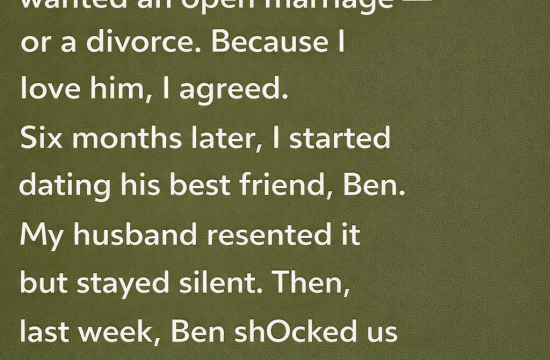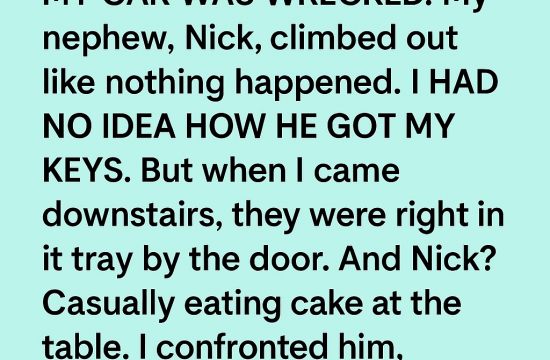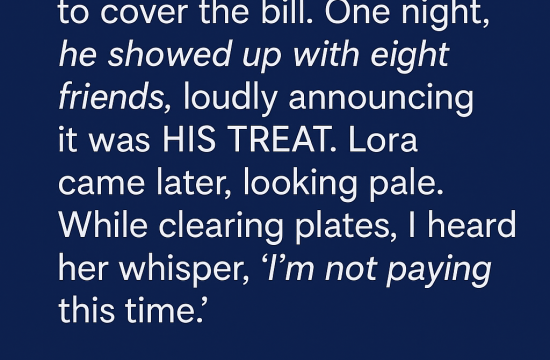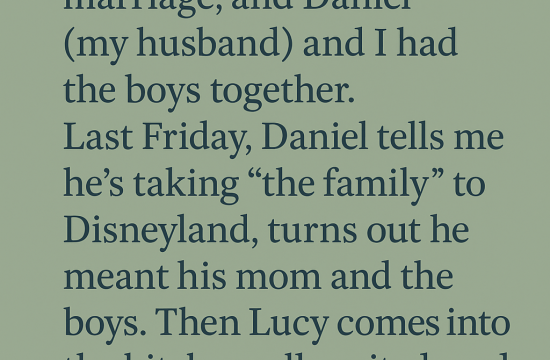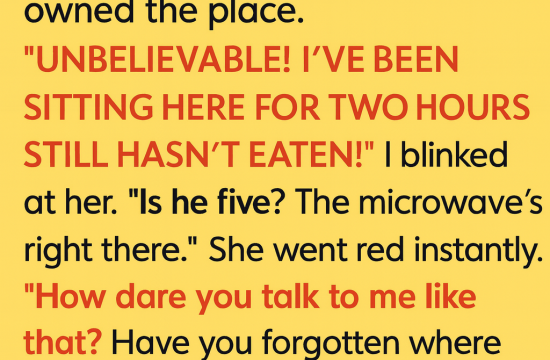Being a parent comes with unique challenges. One moment, you’re so proud of your kid you could burst, but the next, their behavior can devastate you.
That’s exactly what happened to me last Saturday. My boy, Jake, had just led his basketball team to victory against their biggest rivals. I felt ten feet tall as we left the court. To celebrate, we headed to Jake’s favorite diner, a cozy little place that serves the best apple pie in town.
The smell of sizzling burgers and fresh coffee greeted us as we walked in. “Looks like this is the only free table,” I said as we approached one that hadn’t been cleared yet.
Jake’s nose wrinkled at the sight of empty cups, used straws, and burger wrappers scattered across the table. And then, to my shock, he turned to an elderly woman mopping nearby.
“Hey, old lady!” he barked. “This table is filthy. Come clean it—now.”
I froze. So did the woman. She balanced a mop in one hand and a walking stick in the other, her back stooped with age. “Oh, of course,” she said softly, setting the mop aside and hobbling toward us.
Her steps were slow, each one careful. Jake rolled his eyes. “This is pathetic,” he muttered. Then, to my horror, he swept the trash off our table onto the floor. “Let’s see if you can actually do your job. Pick it up!”
Tears welled in her eyes as she crouched with difficulty, leaning on her cane for support.
Anger and embarrassment roared through me. I reached for a half-full bottle of cola, caught Jake’s eye, and tipped it out onto the floor.
Jake laughed. “Yeah, Dad! Teach her a lesson!”
I locked eyes with him. “Oh, someone’s learning a lesson today.” Then I raised my hand to get the manager’s attention.
“Excuse me!” I called. The woman clutched at my sleeve, panicked. “Please, sir, don’t report me. I’ll clean everything. I promise.”
It broke my heart, but I kept my tone firm. “It should’ve been clean before we got here, Grandma,” Jake added cruelly.
The manager appeared. “Good afternoon. What’s going on?”
Jake jumped in. “This lady’s too slow. The table was filthy. She should be fired.”
I spoke before the manager could respond. “Actually, what my son meant is that he’s volunteering to work here as a cleaner for a week. His salary goes straight to this lady.”
“Dad! You can’t be serious!” Jake cried.
“She deserves your respect,” I snapped. “How dare you treat her like this?”
“She’s too old! Look at her!”
“That’s not your concern. She’s earning her living. And you’re about to learn how hard that is.” I turned to the manager. “Do you agree?”
The manager’s brows shot up, then he nodded. “Absolutely. Mrs. Roberts?”
The woman, Mrs. Roberts, looked stunned but nodded through her tears. “Thank you, sir. Thank you.”
“Don’t thank me,” I said. “Thank him—after he’s done.”
Jake scowled, but the next thing I knew, he was holding a mop. As he scrubbed the floor, I invited Mrs. Roberts to sit with me and ordered her a meal on Jake’s allowance. He grumbled, but I ignored him.
For the next week, Jake worked every afternoon at that diner. He mopped floors, wiped tables, and emptied trash cans. At first, he complained bitterly, but soon, something shifted.
One night at home, he quietly started clearing our dinner plates without being asked. His mom raised an eyebrow. “You’re never this eager to help. What’s gotten into you?”
Jake hesitated. “I… I still don’t like the work. But it feels good to see the place clean when I’m done.”
“Do people notice?” I asked.
“The staff do,” he said, looking down. “They gave me a hard time when they found out how I treated Mrs. Roberts. But most customers? They don’t even look at me. Makes you feel invisible.”
My heart softened. “That’s what you made her feel like, Jake.”
He nodded slowly. “Yeah. And it’s not right. She shouldn’t have to work so hard at her age.”
I sighed. “Sometimes life isn’t fair.”
I thought that was the end of it—until Jake’s last day.
I watched him hand in his uniform, then approach Mrs. Roberts, who waited by the counter. “Mrs. Roberts,” he said, his voice steady, “I’m really sorry for how I treated you. And I’m sorry you have to work such a tough job.”
He reached into his pocket and handed her a thick envelope. “I talked to my friends at school. We raised some money for you. It’s not much, but I hope it helps.”
Mrs. Roberts burst into tears, clutching the envelope and thanking him over and over.
In that moment, I felt my chest swell with pride. My son had learned the lesson I hoped for—and given me one more reason to be proud of him.




